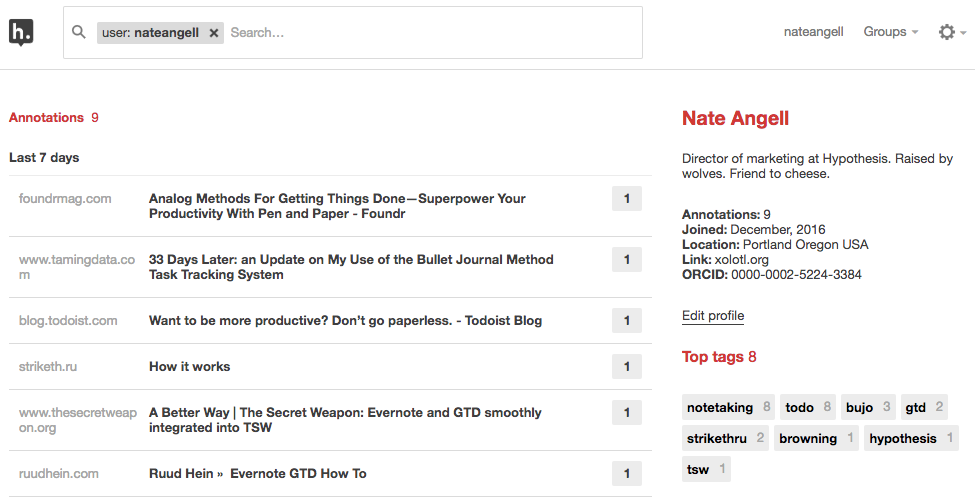Introducing Search and Profiles
Up until now, Hypothesis users have been able to annotate, reply to, and read through annotations. These basic capabilities have generated an explosion of activity: as of yesterday, our community has created a total of 882,053 annotations!
With this release we’re introducing two key features to help you navigate this new layer of information spreading across the web: Search now makes it easy to filter all annotations by keyword, tag, group, or linked page. Profiles finally provide a true home for users and groups—both for themselves, and for others that want to explore their annotations.
Early responses from some of our user testing have been incredible—we’re so grateful to have such an engaged and passionate Hypothesis user base. Some of the feedback we’ve received has been short, but sweet, from “Oh! This is really cool” to “This is exactly what I needed to review all the annotations my students were making in my class”. Read how one of our early testers is using these new features to transform teaching and learning:
“I am excited for the newly redesigned Stream launched by hypothes.is. I now have a major piece in my jigsaw of trying to remix a decentralized Learning Management System (LMS).”
— Greg McVerry, Southern Connecticut State University
Ready to learn more? Let’s take you on a little tour of everything that we’ve built into this release.
Search: find any annotation
When you navigate to the Hypothesis search page, you’ll see all the annotations that you’re authorized to view, including public, group and your personal annotations, listed by domain, title and the number of annotations on each document. Enter keywords, usernames, tags, urls, or groups to further refine your search.
Click on any row in search results to see all the annotations on that document. You can share specific annotations directly from search, view any or all annotations in context, and click on any annotator to view their profile.
User profiles: your annotation home
 Every user now has their own home in Hypothesis: a central place where you and others can view your profile and public activity, and you can find and search all your annotations, public and private.
Every user now has their own home in Hypothesis: a central place where you and others can view your profile and public activity, and you can find and search all your annotations, public and private.
Visit your profile by clicking on your username in the upper right to open a simple web address that you can share with others, like this example: https://hypothes.is/users/nateangell.
You can also customize your profile to reflect your full identity as an annotator: provide your name, description or bio, location, a link to your primary web address, and now, your ORCID ID, linking your Hypothesis profile to your persistent scholarly identifier.
Group profiles: a home for your group
 Just like users, Hypothesis groups now have a new home, with a dynamic view of all documents annotated by group members, combined with the search and profile customization capabilities described above.
Just like users, Hypothesis groups now have a new home, with a dynamic view of all documents annotated by group members, combined with the search and profile customization capabilities described above.
Use the Groups menu on the upper right to focus your view on annotations made in one of your groups. You’ll see a dropdown menu of all your groups and can select from the list to view all the annotations made in any group.
In the example below, you can see the most recent annotations from the Hypothesis Reading group, as well as any tags used by that group. Group members can click on any tag to filter group annotations by that tag, or on the name of any other group member to see all the annotations in that group from a specific person. Administrators of the group can customize the group profile just like they can customize their own user profiles.
What do you think?
We’re already seeing these search and filtering capabilities enable all sorts of new ways to engage with annotation. Let us know how you are using Hypothesis and what you think about these new features: send feedback to support@hypothes.is, or tweet us at @hypothes_is.



